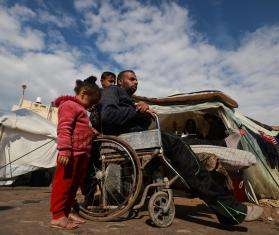Doctors Without Borders/Médecins Sans Frontières (MSF) has launched a major distribution of building materials, hygiene kits, water storage equipment and purification tablets, blankets, and energy bars in Haiti’s most remote, mountainous southwestern region. Each of the 9,530 beneficiary families will also receive a set of 10 corrugated metal sheets, enough to rebuild a 130 square-foot roof that will improve the quality of shelters and help maintain a level of dignity.
"In remote areas of the mountains, people were forced to rebuild hastily by salvaging materials that had been blown around by the wind, often broken and full of holes,” said Lily Caldwell, MSF's emergency team coordinator. “The poor construction quality of the buildings does not provide adequate shelter from the elements, especially heavy rains, and this can have direct consequences for their health."
Managing these distribution logistics, which have benefitted from support from the World Food Program, is a huge challenge. These areas often have no roads, nor security.
"Bad weather often limits our window of activity,” said Caldwell, “sometimes even grounding the helicopters, which are our only means of reaching these remote areas. These long delays create a lot of frustration, so our field teams have to spend a great deal of time explaining our actions before we can proceed and ensure that distribution occurs under the right conditions, all of which leads to even further delays."

Once Assessments Are Complete, MSF Provides Support
MSF has relied on a partnership with community members to ensure the success of the initiative. More than 250 MSF national staff and 39 international staff are still active in the post-Matthew response, in addition to the regular response teams working in six health facilities in the country.
“In the presence of MSF staff, the beneficiary collects the items for his or her family [an average of 7 people] from a community representative who previously accepted the items at the time they were delivered," explained field distribution coordinator, François Giddey.
In the aftermath of Hurricane Matthew, MSF carried out an emergency response in the departments of Grande Anse, Sud, and Nippes. Teams also provided support to health facilities in Nord, Artibonite, and Ouest departments.
The organization treated 832 people injured during the hurricane, treated 458 cholera patients, and provided other types of medical care to 6,341 people. Teams rehabilitated 26 water outlets and has so far provided 10,092,500 liters of clean water by tanker trucks.
At the same time, in support of the Ministry of Health, MSF provided cholera vaccinations to approximately 13,800 people in the most affected and remote areas of Sud and in the town of Coteaux. Throughout 2017, MSF expects to maintain a regular presence in the Port-à-Piment community in Sud department to reinforce the health care services provided there.
In 2017, MSF operates six medical facilities in the metropolitan area of Port-au-Prince: the Drouillard hospital burn unit, the Martissant 25 emergency center, the Nap Kenbe emergency surgical hospital, the CRUO referral center for obstetrical emergencies, the Pran Men'm clinic for survivors of sexual and gender-based violence, and the emergency and cholera response unit, which can be operational within hours. MSF also supports the Ministry of Health through the Diquini center for cholera patients and has been active in Haiti on a regular basis since 1991.





